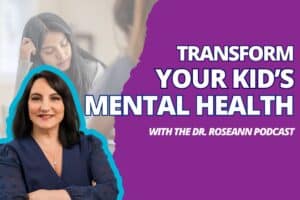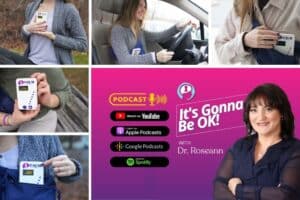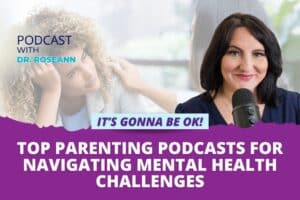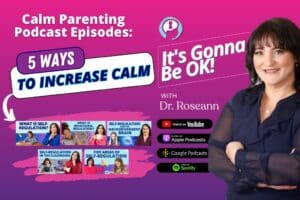Supporting children or teens with OCD can be challenging as OCD and parenting don’t seem to mix. But with the right knowledge and strategies, you can become the guiding light for your OCD child’s behavior management. Understanding OCD in children is the first step toward creating a nurturing environment at home.
Obsessive-Compulsive Disorder, or OCD, can be unbelievably stressful and challenging in your child's mental landscape. This mental health condition is characterized by recurring thoughts and repetitive behaviors.
Such thoughts are called obsessions, and their behaviors are called compulsions. A child feels driven to perform them out of fear. These fearful and intrusive thoughts and behaviors can significantly disrupt one's daily life and cause distress.
Challenges Faced by OCD Children at Home
Parenting kids with OCD comes with its unique challenges, particularly within the confines of the home environment. These children often experience significant difficulties affecting their daily lives and family dynamics. Parents must know these challenges and find effective ways to support their children.
One of the primary challenges is the interference of obsessions and compulsions in daily activities. Simple tasks like getting ready for school, completing homework, or participating in family events can become prolonged and exhausting due to the need to perform ritualistic behaviors or seek reassurance. This can lead to delays, frustration, and heightened anxiety for the child and the entire family.
If your child is repeating words endlessly without reason or asking you the same question a number of times, it may be time to seek the help of a qualified healthcare provider. They may help diagnose OCD or another mental health issue in your child
Additionally, the presence of rituals and compulsions can disrupt family routines. For example, a child with OCD may require specific bedtime rituals that prolong the nighttime routine for everyone. This can cause stress and tension within the family, impacting the quality of sleep for the child and other family members.
Furthermore, parents may struggle to balance providing support and enabling childhood OCD symptoms. It's natural to want to alleviate their distress, but constantly giving in to compulsive rituals or providing excessive reassurance can unintentionally reinforce their OCD behaviors. Finding the right balance of support, encouragement, and gently challenging their OCD patterns can be difficult for parents.
The impact of OCD on siblings should also be acknowledged. Siblings may feel neglected, frustrated, or confused by their sibling's illogical obsessions and compulsions, leading to sibling rivalry or emotional strain within the family. It is even worse when there is relationship OCD, and the child fixates on a sibling or parent. It's crucial for parents to address these feelings and involve siblings in the process of understanding and supporting their brother or sister with an OCD diagnosis.
Despite these challenges, remember that you play a big role in creating a supportive environment at home. Learning about OCD, fostering open communication, promoting empathy, and seeking professional help can help parents navigate these challenges more effectively.
With patience, understanding, a united front, and lots of OCD resources for parents, families can work together to provide the necessary support for the child with OCD and create an atmosphere of understanding and acceptance within the home.
How to Deal with OCD and Create a Supportive Environment for Your Child
Parenting OCD means shattering the misconceptions and myths that cloud a child's mind. Creating a supportive environment is crucial for children with OCD. These kids need a safe space to express their feelings and worries. Here are some OCD parenting tips:
1. Educate yourself
Learn about OCD and its impact on your child's life. Understand that OCD is not a choice or a result of poor parenting. Accurate information about the signs of OCD and symptoms of other mental health disorders can help parents recognize when their child may need extra support. It’s important to understand that OCD is a medical condition and not something that the child can just “get over” with a few simple strategies.
2. Foster Open Communication
Encourage your kid or teenager to express their feelings and fears without judgment. Let them know you are there to listen and support them unconditionally. Provide a safe environment for your child to explore their feelings and build trust with you. That is how you foster communication.
3. Avoid Enabling Behaviors
While it's natural to want to alleviate your child's anxiety, try not to participate in their rituals or provide excessive reassurance. For example, don’t participate in their OCD bedtime rituals. Doing so can inadvertently reinforce their OCD symptoms.
Instead, focus on helping your child build their coping skills. Encourage your child to challenge their intrusive thoughts and behaviors. Support them as they gradually work towards facing their fears and learning to tolerate the uncertainty that comes with it.
4. Practice Patience and Understanding
Recognize that OCD can frustrate you and your child. Approach situations with empathy and provide reassurance that you are there to support them throughout their journey. Keep this quote at heart, “A child needs your love most when he deserves it least.
Communication Strategies for Discussing OCD with Your Child
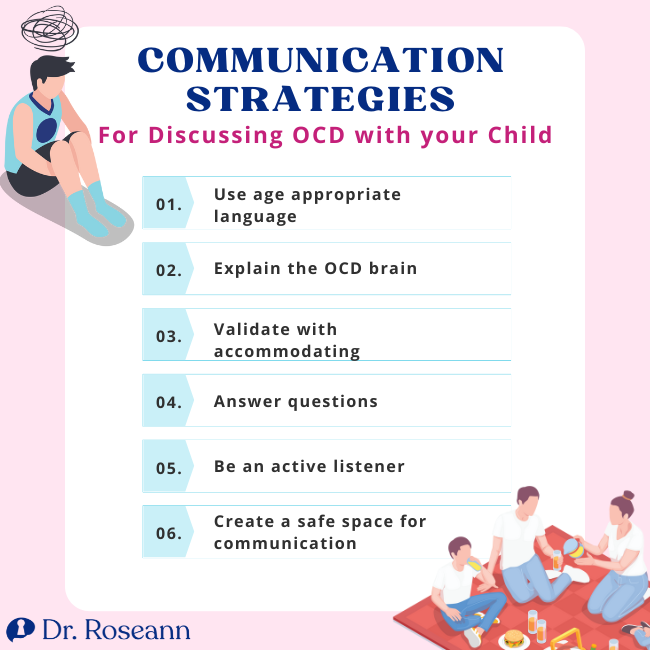
When conversing about OCD with your child, it is crucial to use age-appropriate language. Avoid scary or confusing terminology that may overwhelm their young minds. Instead, explain OCD in terms they can understand, painting a picture that resonates with their unique perspective. Explain how the OCD brain works, as this helps kids of all ages feel more in control. Doing so creates a foundation of comprehension where our children can grasp the essence of their challenges.
Transparency and honesty are the guiding principles as we venture further. When your child poses questions, provide them with truthful and straightforward answers. Resist the temptation to downplay or dismiss their concerns, for every thought and worry holds significance in their world. Acknowledge the gravity of their inquiries. Build trust and ensure that our children feel safe to confide in us.
Validation is the key to unlocking a realm of emotional understanding, but parents must be careful to do so without accommodating. Let us embrace the power of validation, assuring our children that their feelings are valid and understandable. Free them from the chains of judgment or criticism, creating an environment where they can freely express their emotions.
Encourage them to voice their fears and worries, and let us be there, unwavering, as they pour their hearts out. In these moments, let our ears be open as we actively listen without interrupting.
Incorporating these communication strategies creates a safe space for our children to share their unwanted thoughts, fears, and triumphs. We reassure them that they are not alone on this journey. Remember that our tone and approach hold immense power in communication. Let empathy be our guide.
Natural Solutions to Managing OCD Symptoms
Cognitive-Behavioral Therapy (CBT) and a therapy called Exposure and Response Prevention (ERP) equip your child with invaluable tools to tackle obsessive thoughts and compulsions. But let's not forget the potential wonders of natural therapies such as supplements, neurofeedback, and PEMF (Pulsed Electromagnetic Field Therapy).
CBT techniques are like weapons against OCD. ERP is a cognitive behavioral therapy method that allows your child to confront their fears in a controlled and gradual manner, exposing them to the anxiety-inducing situations that trigger their obsessions.
The CBT therapist or clinical psychologist will encourage your child to resist engaging in their usual compulsive behavior. ERP is all about breaking free from OCD chains. By facing their fears head-on and resisting the urge to perform rituals, your child learns to rewire their brain and develop healthier responses to their OCD triggers. That is the best treatment for OCD in kids and not necessarily Selective Serotonin Reuptake Inhibitors.
Alternative therapies like neurofeedback add an extra dimension to the battle against OCD. Neurofeedback uses real-time displays of brain activity to train your child's brainwaves. It helps them learn self-regulation and improve their emotional functioning.
On the other hand, PEMF therapy is a cutting-edge childhood OCD treatment that harnesses the power of low-frequency electromagnetic fields to stimulate the body's natural healing processes. It's like a gentle energy dance that works magic on your child's brain. PEMF therapy has shown promise in managing mood disorders, including OCD. It works by improving brain function and reducing the symptoms of anxiety disorders.
Always remember… “Calm Brain, Happy Family™”
Disclaimer: This article is not intended to give health advice and it is recommended to consult with a physician before beginning any new wellness regime. *The effectiveness of diagnosis and treatment vary by patient and condition. Dr. Roseann Capanna-Hodge, LLC does not guarantee certain results.
Are you looking for SOLUTIONS for your struggling child or teen?
Dr. Roseann and her team are all about science-backed solutions, so you are in the right place!
Find out more about Dr. Roseann’s first-of-its-kind supplement line, Neurotastic™ Multi-Mag Brain™ Formula to address anxiety symptoms
Empower yourself with natural solutions for your child's mental health and behavior. Download our FREE quick start guide and start supporting your child today.
You can get her books for parents and professionals, including: It’s Gonna Be OK™: Proven Ways to Improve Your Child’s Mental Health, Teletherapy Toolkit™ and Brain Under Attack: A Resource For Parents and Caregivers of Children With PANS, PANDAS, and Autoimmune Encephalopathy.
If you are a business or organization that needs proactive guidance to support employee mental health or an organization looking for a brand representative, check out Dr. Roseann’s professional speaking page to see how we can work together.
Dr. Roseann is a Children’s Mental Health Expert and Licensed Therapist who has been featured in/on hundreds of media outlets including The Mel Robbins Show, CBS, NBC, PIX11 NYC, Today, FORBES, CNN, The New York Times, The Washington Post, Business Insider, Women’s Day, Healthline, CNET, Parade Magazine and PARENTS. FORBES called her, “A thought leader in children’s mental health.”

She coined the terms, “Re-entry panic syndrome” and “eco-anxiety” and is a frequent contributor to media on mental health.
Dr. Roseann Capanna-Hodge has three decades of experience in working with children, teens and their families with attention-deficit hyperactivity disorder (ADHD), autism, concussion, dyslexia and learning disability, anxiety, Obsessive Compulsive Disorder (OCD), depression and mood disorder, Lyme Disease, and PANS/PANDAS using science-backed natural mental health solutions such as supplements, magnesium, nutrition, QEEG Brain maps, neurofeedback, PEMF, psychotherapy and other non-medication approaches.
She is the author of three bestselling books, It’s Gonna Be OK!: Proven Ways to Improve Your Child's Mental Health, The Teletherapy Toolkit, and Brain Under Attack. Dr. Roseann is known for offering a message of hope through science-endorsed methods that promote a calm brain.
Her trademarked BrainBehaviorResetⓇ Program and It’s Gonna be OK!Ⓡ Podcast has been a cornerstone for thousands of parents facing mental health, behavioral or neurodevelopmental challenges.
She is the founder and director of The Global Institute of Children’s Mental Health, Neurotastic™Brain Formulas and Dr. Roseann Capanna-Hodge, LLC. Dr. Roseann is a Board Certified Neurofeedback (BCN) Practitioner, a Board Member of the Northeast Region Biofeedback Society (NRBS), Certified Integrative Mental Health Professional (CIMHP) and an Amen Clinic Certified Brain Health Coach. She is also a member of The International Lyme Disease and Associated Disease Society (ILADS), The American Psychological Association (APA), Anxiety and Depression Association of America (ADAA) National Association of School Psychologists (NASP), International OCD Foundation (IOCDF).
© Roseann-Capanna-Hodge, LLC 2023



